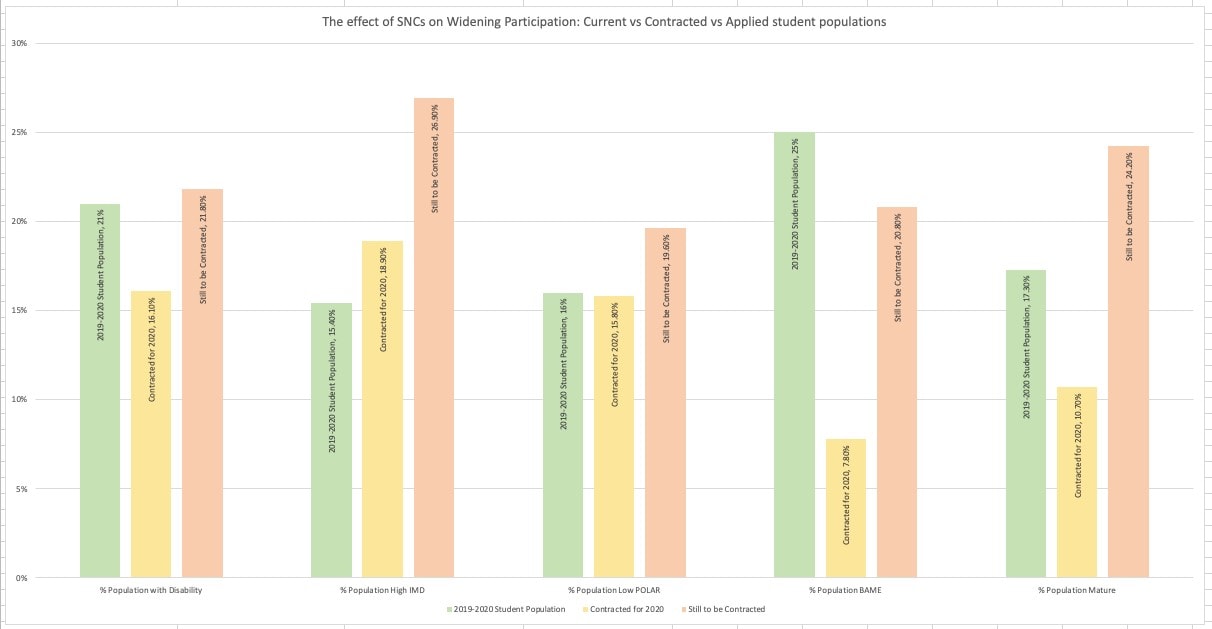It’s Monday 1st June 2020, 22:57. I’m dropping off to sleep as my phone pings. I see the subject and my heart sinks: “Your Student Number Control”.
As I read the figures on the screen, they are soon replaced by the names and faces, hopes and dreams of a particular sub-set of applicants that appear to have been otherwise forgotten – the looked after child, the care leaver, the first to university in their family, the student who needs adapted accommodation to be able to live independently at university. The applicant wholly reliant on a bursary to make this happen.
It’s that time of year
There is a clear trend in our admissions cycle at this point in the year. Students from widening participation (WP) backgrounds apply later, audition later and accept offers later than their more privileged counterparts. So many of the students above will have not yet received their offers of study.
These under-represented students are the people I work to advocate for in the setting of our small, specialist arts institution. With music having been de-prioritised in curricula and consequently all but defunded by state schools, the widening participation initiatives I support help level-up access to music education and careers in music for thousands of such students each year, bringing equality and equity to those from low participation, high deprivation areas.
These outreach events dared our applicants to dream of an education proposition they mightn’t have otherwise realised was within their reach, or mightn’t otherwise have known existed. And lest we forget that disadvantage breeds disadvantage. 43% of our learners on programme this year are part of multiple widening participation categories.
A disproportionately high number will have dyslexia, dyspraxia, dyscalculia, ADD, Asperger’s, Autism and a whole host of other specific learning requirements. Whether these things are the cause or effect of creativity, we don’t know, but in our creative arts education environment, we do know that they’re not barriers to learning.
Fair’s fair
The letter from the Minister says that Student Number Controls will bring “fairness” to the sector. But what about fairness for these students? The message appears to be “stop recruiting” – even if it makes your process unfair, and even if it puts the most vulnerable students at risk of not having a place to study in September.
Referring back to the beginning of our recruitment cycle for September 2020 study, students were told, as usual, that if they applied by 15th January, we’d give their application equal consideration to the others we receive by the same deadline. One could now look back on this as an untruth.
This will be especially disappointing for those applicants who have made particular effort, over and above the usual, with their application for university study. Each of our own applicants, for example, puts heart and soul into a portfolio submission, in addition to their standard UCAS application.
Their submitted audio and video is used by our specialist Admissions Tutors, in conjunction with their personal statement, references, predicted grades and more, to complete a desk based assessment of their suitability for study, before being invited in for an audition event. Between January and May each year, it’s our privilege to meet over 2,000 right-brain creatives (if you’re prepared to subscribe to this concept) at such auditions, in order to find some 1,000 new entrants for September study.
Lock in
This year, Covid-19 delayed student recruitment activity across the sector, and so UCAS extended the usual May offers deadline placed upon us so that students and institutions, alike, had a little more time to respond. It therefore extended our audition window to mid-June, after the decisions on SNCs were made. This extra time was particularly important for our Widening Participation students, who take statistically longer to audition, and therefore longer to “lock in” their choice of University with a provider.
See here the increase in the number of students with one or more WP characteristic who “locked in” with our provider in the summer months of our 2019 acquisition cycle, vs those students without any WP characteristic.


The reasons why are not difficult to surmise. For some, more technicalities have to be considered, more arrangements need to be made. For others, less family support, less financial support is available to them than the average student is lucky enough to have.
In our case, the 2020 Student Number Control, implemented before many WP students will have made their decisions, barely covers a third of our would-be learners. Having not waited for UCAS’ deadlines to pass (for Universities to make offer decisions and applicants to make choices), the safeguard algorithm for the SNC creates an unfair admissions process for some students, disproportionately disadvantaging those from Widening Participation backgrounds, who take longer to make their decisions. This year, of course, they are likely to take even longer to confirm an offer.
The impact of this is a less diverse, less equal, less equitable university environment.

Mind the gap
An SNC implemented in this way will undoubtedly undermine the efforts of our access and participation plans, creating an even larger gap between the UK’s most privileged and those most under-represented, in UK higher education. It is clear that the very premise of the equal consideration deadline has been compromised and it all comes down to a misuse of data.
Despite championing the use of data in our sector by way of initiatives such as JISC’s Analytics Labs, IHE’s Data Forum etc, I’m not a fan of any process that relies solely on quantitative data to dictate its outcome. I embrace data as decision support, yes, but decision making needs more depth and must not be used to blur the faces, hopes, and dreams of students out of the equation.
If our institution used an algorithm alone for offer making, we would have exceeded our SNC long before it was implemented, and by that same policy, would have been able to enrol all of those students by way of the backup algorithm. No auditions. No interviews. A quantitative analysis of a person’s potential for learning, with a yes/no decision made by a computer in milliseconds. The Minister’s letter makes it more than clear. More offers, made earlier + More students accepted, earlier = A higher student number control.
I worry for the students affected, and wonder whether DfE will be able to offer positive resolution to the letter that my colleagues and I will undoubtedly write. I wonder if it will see the students behind the numbers. I hope this isn’t a mistake that lasts.












